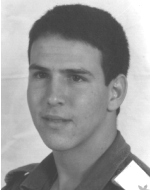Eliash, Chaim
Ben Rivka and Shlomo. He was born on December 31, 1964 in Ramat Gan. Was the youngest son of his parents and a younger brother of his two older sisters. Haim attended the “Atid” and “Hillel” elementary schools. He wanted to continue his high school studies in a vocational school, because he wanted to specialize in architecture. Haim therefore moved to Givatayim to study at ORT Technicom. Although he did not invest much effort in his studies, he achieved very good achievements. Haim showed a tendency to the real professions, and excelled in them. He devoted his spare time to helping others: he volunteered to help the IDF disabled veterans at Beit Halochem, helped his friends who had trouble learning mathematics, and worked in the youth movement. To Europe, to encourage the Maccabi team in the European Championship finals, and Haim was recruited to the IDF in August 1983. He was invited to a course for sailors, but during the course of the preparations he decided that the sea was not suitable for him. Haim wanted to give his best to the IDF and to succeed in his service as much as he could, he aspired to be an officer and chose the Artillery Corps, and he completed his basic training as an outstanding apprentice and at the end he was sent to an artillery battalion in the Golan Heights. And after graduating from the army, Haim returned as an officer to the artillery unit where he began his service as a corporal.In the battalion, Haim held many and varied positions: A third officer in the battery was an artillery officer and a battery commander, who had a second home And after completing his duties in the battalion he was assigned to the field artillery school, where he served as deputy commander of the commanding corps. It is a difficult and demanding role, and in the manner that filled it, life was revealed as an officer and as a person winking from a special material. His commanders admired him as “an excellent, efficient, intelligent, high-functioning officer who performs excellent, responsible and dedicated staff work.” In the artillery school, he dealt with every problem, large and small, and invested his soul in soldiers. Chaim decided not to continue serving in the army, and in August 1986 he decided to sign a permanent army service. After his death, his commanding officer wrote: “Even though he was not a graduate of the Command and Staff College, he excelled in his ability. He controlled every shell, every hour of the engine, every day of reserve duty, in every combat job or training. There was no figure that escaped his scrutiny. There was no request, request or request from any of the artillery elements in the Northern Command that was not answered immediately and always positively. His control of the data was perfect … He achieved everything he wanted because of his credibility, his professionalism, his simplicity of manner and manner of conduct. “At the end of 1989, he began to feel pain and became ill with a malignant disease. He was buried at the military cemetery in Kiryat Shaul, where he died at the age of twenty-six, leaving behind his parents and two sisters – Meira and Orna.
